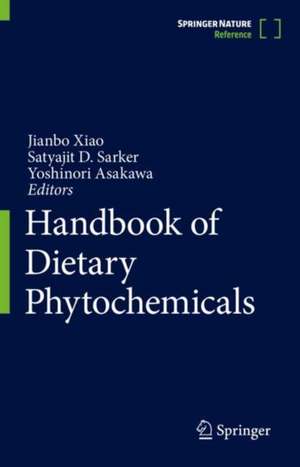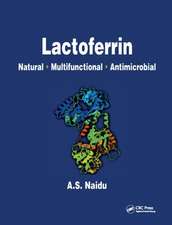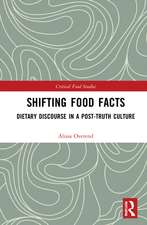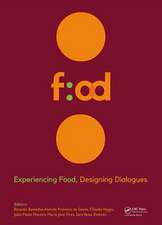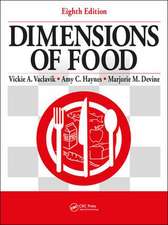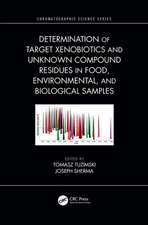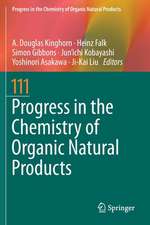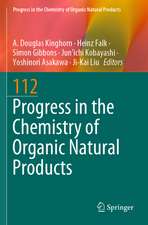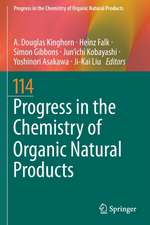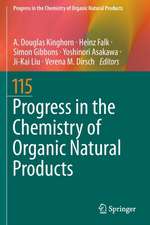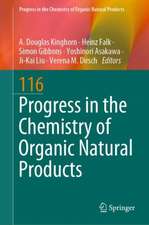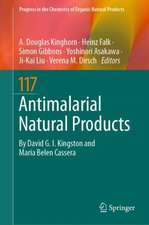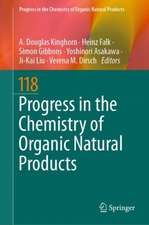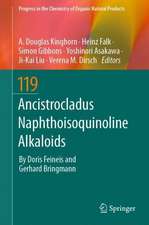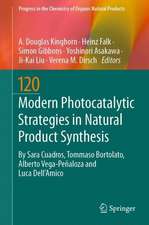Handbook of Dietary Phytochemicals: Handbook of Dietary Phytochemicals
Editat de Jianbo Xiao, Satyajit D. Sarker, Yoshinori Asakawaen Limba Engleză Hardback – 10 aug 2021
Preț: 3964.50 lei
Preț vechi: 4834.75 lei
-18% Nou
Puncte Express: 5947
Preț estimativ în valută:
758.62€ • 794.05$ • 631.40£
758.62€ • 794.05$ • 631.40£
Carte disponibilă
Livrare economică 10-24 martie
Preluare comenzi: 021 569.72.76
Specificații
ISBN-13: 9789811541476
ISBN-10: 9811541477
Pagini: 1953
Ilustrații: XXIV, 1953 p. 321 illus., 111 illus. in color. In 3 volumes, not available separately.
Dimensiuni: 155 x 235 mm
Greutate: 4.26 kg
Ediția:1st ed. 2021
Editura: Springer Nature Singapore
Colecția Springer
Seria Handbook of Dietary Phytochemicals
Locul publicării:Singapore, Singapore
ISBN-10: 9811541477
Pagini: 1953
Ilustrații: XXIV, 1953 p. 321 illus., 111 illus. in color. In 3 volumes, not available separately.
Dimensiuni: 155 x 235 mm
Greutate: 4.26 kg
Ediția:1st ed. 2021
Editura: Springer Nature Singapore
Colecția Springer
Seria Handbook of Dietary Phytochemicals
Locul publicării:Singapore, Singapore
Cuprins
Introduction of Phytonutrients.- Antioxidants in Diets and Food.- Dietary Flavonols and O-Glycosides.- Chemopreventive potential of flavones, flavonols, and their glycosides.- Flavonoid C-glycosides in diets.- Biflavonoids and oligomeric flavonoids from food.- Soy isoflavones.- Citrus Flavanones.- Chalcones in Diets.- Dietary Xanthones.- Prenylated Flavonoids in Food.- Anthocyanins in Food.- Carotenoids in food.- Dietary Triterpenoids.- Sesquiterpenes in Fresh Food.- Sesquiterpenes in Cereals and Spices.- Dietary monoterpenoids.- Dietary diterpenoids.- Tea Catechins.- Theaflavins, Thearubigins, and Theasinensins.- Stilbenoids in Grapes and Wine.- Chlorogenic, caffeic, ferulic acids and their derivatives in foods.- Caffeoylquinic Acids.- Coumaric and Cinnamic Acids in Food.- Dietary Ellagitannins.- Gallotannins in Food.- Vitamins from food.- Curcumin in Food.- Isothiocyanates in food.- Polysaccharides in Food.- Dietary Fibers.- Oligosaccharides in Food.- Unsaturated fatty acids.- Saponins in Food.- Dietary Phytoecdysteroids.- Alkaloids in Diet.- Dietary Coumarins.- Lignans in Diets.- Gingerols and Shogaols from Food.- Organosulfur Compounds in Food.- Ginsenosides in Diets.- Procyanidins in Food.- Pyrazines.in food.- Phenylpropanoids (Phenylpropenes) in Diets.- Polyynes in Food.- Starch.
Notă biografică
Professor Jianbo Xiao is current a Professor of Faculty of Food Science & Technology, University of Vigo, Spain. He obtained his PhD in nutritional science from Okayama Prefectural University, Japan (2009). He worked as a Postdoc supported by AvH foundation at University of Würzbug, Germany (2013- 2015). Then he worked as an assistant professor on the University of Macau from 2015 to 2020. His research is focusing on dietary polyphenols. He has accepted and published more than 200 peer reviewed papers including Nature Reviews Drug Discovery, Biotechnology Advances, Medicinal Research Reviews, Trends in Food Science & Technology, Critical Reviews in Food Science and Nutrition, Food Chemistry, Molecular Nutrition and Food Research, and so on (Scopus citation: 7000, H-index: 45). Prof. Xiao was selected as 2016, 2017, 2019, and 2020 Clarivate Analytics Highly Cited Researcher (HCR) in agricultural science, and he is currently editor in chief of Food Frontiers (Wiley), associate editor of Journal of Berry Research, and the editorial board member of Trends in Food Science & Technology, Critical Reviews in Food Science and Nutrition, Food Chemistry, Journal of Nutritional Biochemistry, Food and Chemical Toxicology, Phytomedicine, Industrial Crops and Products, Environmental Toxicology and Pharmacology, Phytochemistry, Current Drug Metabolism, Food Science and Human Wellness, and so on. He was a chairman of the 2015 International Symposium on Phytochemicals in Medicine and Food (ISPMF2015, Shanghai) organized by the Phytochemical Society of Europe, and its second edition (2-ISPMF, Fuzhou, 2017), third edition (3-ISPMF, Kunming, 2018) and fourth edition (4-ISPMF, Xi’an, 2020).
Professor Satyajit D. Sarker is a Professor of Pharmacy and the Director of School of Pharmacy and Biomolecular Sciences, Liverpool John Moores University (LJMU), Liverpool, UK. He is the Founding Head of the Centre for Natural Products Discovery at LJMU.He obtained his B.Pharm. (Hons.) and M.Pharm. (postgraduate) degrees from the University of Dhaka and his Ph.D. in Phytochemistry from the University of Strathclyde, Glasgow, UK. Prof. Sarker is a world-renowned natural products researcher, whose research falls in the area of pharmaceutical and natural products chemistry and rational drug design (medicinal chemistry), and focuses on anticancer, analgesic, anti-inflammatory, antioxidant, antimalarial and antimicrobial properties, and cancer chemopreventive and wound-healing potential of purified compounds from higher plants as well as novel synthetic organic molecules.
Prof. Sarker is one of the most cited phytochemists and has over 630 publications with more than 18,800 citations, an h-index of 61, and an i10 index of 401 (Google Scholar). He has been the Editor-in-Chief of Phytochemical Analysis since 2010, has been part of the Editorial Advisory Board of more than 40 journals, and regularly reviews articles for more than80 international journals. He co-authored the popular textbook, Chemistry for Pharmacy Students, published by Wiley & Sons in 2007, and subsequently, this book was translated in Indonesian, Japanese, Greek and Portuguese languages; the second edition of this book was published in 2019. He is also the co-author of the only book on Steroid Dimers, published by the same publisher in 2012. He co-edited both the second and third editions of the book, Natural Products Isolation, published by Humana Press Springer-Verlag, respectively, in 2005 and 2012. His novel contribution in the field of phytochemistry is the book Computational Phytochemistry, published by Elsevier in 2018, and his latest book is Medicinal Natural Products: A Disease-Focused Approach, published by Elsevier in 2020.
Prof. Dr. D.H.C. Yoshinori Asakawa first studied biology at the Tokushima University, then went to graduate school at Hiroshima University in 1964 and studied organic chemistry, and obtained his PhD degree there and was appointed as a research assistant. Then, Prof. Asakawa went to the Université Louis Pasteur, France, as a postdoctoral fellow, where he worked for 2 years (1972–1974) with Prof. Guy Ourisson, one of the most original natural product chemists worldwide. In 1976 he moved to Tokushima Bunri University as an associate professor, and was promoted to full professor in 1981. Prof. Asakawa served as dean twice, and since 1986, he is director of the Institute of Pharmacology.
Prof. Asakawa is the former editor of Phytomedicine and Spectroscopy, and serves on the editorial boards of the Journal of Natural Products, Phytochemistry, Phytochemistry Letters, Planta Medica, Current Chemistry and Biology, Fitoterapia, Flavour and Fragrance Journal, Natural Product Research, Natural Product Communications, Arkivoc and Malaysian Journal of Sciences, among others. He is the president of the Phytochemical Society of Asia (PSA) and of Chemistry of Terpenes, EssentialOils, and Aromatics (TEAC) and permanent committee member of ISEO.
His research interests are the isolation and structure elucidation of bioactive secondary metabolites of bryophytes, pteridophytes, and inedible mushrooms; medicinal and aromatic plants and insects and their bioassay; biotransformation of secondary metabolites by fungi and mammals; total synthesis of natural products; chemical reaction of organic per-acids; and chemical phylogeny of spore-forming plants. Prof. Asakawa has published, up to now, 700 original papers, 14 reviews, About the Editors xiii and 40 books. His three books on the “chemical constituents in bryophytes,” appeared in “Progress in the Chemistry of Organic Natural Products Vol. 42 (1982), 65 (1995) and 95 (2013)” (Springer Verlag), are the “bibles” for bryophyte researchers, biochemists, phytochemists, and others.
For his outstanding research, he was awarded the Hedwig Medal by the International Association of Bryologists; the International Prize of Phytochemistry; Jack Cannon Gold Medal; International Symposium of Essential Oils Award; Gusi International Peace Prize; Gerald Blunden Award; Japanese Society of Pharmacognosy Prize; Gold Medal and Doctor Honoris Causa from Lublin Medical University, Poland; Polish Ambassador of Pharmacy and Fellow of The National Society of Ethnopharmacology, India; and the honorary membership of Turkish Academy of Science.
Since 1978, he was invited as the opening, plenary and invited lecturers from 52 countries and he invited 57 post docs and 30 students from various countries into his laboratory and organized International symposia for 8 times in his University as the chairperson.
Professor Satyajit D. Sarker is a Professor of Pharmacy and the Director of School of Pharmacy and Biomolecular Sciences, Liverpool John Moores University (LJMU), Liverpool, UK. He is the Founding Head of the Centre for Natural Products Discovery at LJMU.He obtained his B.Pharm. (Hons.) and M.Pharm. (postgraduate) degrees from the University of Dhaka and his Ph.D. in Phytochemistry from the University of Strathclyde, Glasgow, UK. Prof. Sarker is a world-renowned natural products researcher, whose research falls in the area of pharmaceutical and natural products chemistry and rational drug design (medicinal chemistry), and focuses on anticancer, analgesic, anti-inflammatory, antioxidant, antimalarial and antimicrobial properties, and cancer chemopreventive and wound-healing potential of purified compounds from higher plants as well as novel synthetic organic molecules.
Prof. Sarker is one of the most cited phytochemists and has over 630 publications with more than 18,800 citations, an h-index of 61, and an i10 index of 401 (Google Scholar). He has been the Editor-in-Chief of Phytochemical Analysis since 2010, has been part of the Editorial Advisory Board of more than 40 journals, and regularly reviews articles for more than80 international journals. He co-authored the popular textbook, Chemistry for Pharmacy Students, published by Wiley & Sons in 2007, and subsequently, this book was translated in Indonesian, Japanese, Greek and Portuguese languages; the second edition of this book was published in 2019. He is also the co-author of the only book on Steroid Dimers, published by the same publisher in 2012. He co-edited both the second and third editions of the book, Natural Products Isolation, published by Humana Press Springer-Verlag, respectively, in 2005 and 2012. His novel contribution in the field of phytochemistry is the book Computational Phytochemistry, published by Elsevier in 2018, and his latest book is Medicinal Natural Products: A Disease-Focused Approach, published by Elsevier in 2020.
Prof. Dr. D.H.C. Yoshinori Asakawa first studied biology at the Tokushima University, then went to graduate school at Hiroshima University in 1964 and studied organic chemistry, and obtained his PhD degree there and was appointed as a research assistant. Then, Prof. Asakawa went to the Université Louis Pasteur, France, as a postdoctoral fellow, where he worked for 2 years (1972–1974) with Prof. Guy Ourisson, one of the most original natural product chemists worldwide. In 1976 he moved to Tokushima Bunri University as an associate professor, and was promoted to full professor in 1981. Prof. Asakawa served as dean twice, and since 1986, he is director of the Institute of Pharmacology.
Prof. Asakawa is the former editor of Phytomedicine and Spectroscopy, and serves on the editorial boards of the Journal of Natural Products, Phytochemistry, Phytochemistry Letters, Planta Medica, Current Chemistry and Biology, Fitoterapia, Flavour and Fragrance Journal, Natural Product Research, Natural Product Communications, Arkivoc and Malaysian Journal of Sciences, among others. He is the president of the Phytochemical Society of Asia (PSA) and of Chemistry of Terpenes, EssentialOils, and Aromatics (TEAC) and permanent committee member of ISEO.
His research interests are the isolation and structure elucidation of bioactive secondary metabolites of bryophytes, pteridophytes, and inedible mushrooms; medicinal and aromatic plants and insects and their bioassay; biotransformation of secondary metabolites by fungi and mammals; total synthesis of natural products; chemical reaction of organic per-acids; and chemical phylogeny of spore-forming plants. Prof. Asakawa has published, up to now, 700 original papers, 14 reviews, About the Editors xiii and 40 books. His three books on the “chemical constituents in bryophytes,” appeared in “Progress in the Chemistry of Organic Natural Products Vol. 42 (1982), 65 (1995) and 95 (2013)” (Springer Verlag), are the “bibles” for bryophyte researchers, biochemists, phytochemists, and others.
For his outstanding research, he was awarded the Hedwig Medal by the International Association of Bryologists; the International Prize of Phytochemistry; Jack Cannon Gold Medal; International Symposium of Essential Oils Award; Gusi International Peace Prize; Gerald Blunden Award; Japanese Society of Pharmacognosy Prize; Gold Medal and Doctor Honoris Causa from Lublin Medical University, Poland; Polish Ambassador of Pharmacy and Fellow of The National Society of Ethnopharmacology, India; and the honorary membership of Turkish Academy of Science.
Since 1978, he was invited as the opening, plenary and invited lecturers from 52 countries and he invited 57 post docs and 30 students from various countries into his laboratory and organized International symposia for 8 times in his University as the chairperson.
Textul de pe ultima copertă
Caracteristici
Describes link between dietary phytochemicals and health Suggests how to correctly cook foods rich in phytochemicals Discusses the structure-activity relationship of dietary phytochemicals for prevention of modern diseases
